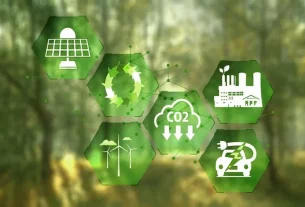In a groundbreaking discovery, scientists have unveiled a new method to convert wastewater into biofuel, offering a revolutionary solution that could cut aircraft emissions by as much as 70%. This new biofuel, derived from biomass and agricultural waste, provides a sustainable alternative to conventional jet fuel, helping the aviation industry reduce its carbon footprint and make significant strides toward meeting global climate targets.
The Need for Sustainable Aviation Fuel
The aviation industry is responsible for a substantial portion of global greenhouse gas emissions. According to the International Air Transport Association (IATA), aviation contributes around 2-3% of global carbon dioxide (CO2) emissions. As air travel continues to grow, reducing these emissions has become a priority for both environmental groups and the aviation industry itself.
While many efforts have focused on improving aircraft efficiency and developing electric or hybrid aircraft, sustainable aviation fuel (SAF) made from renewable sources has emerged as one of the most promising solutions to decarbonize the sector. SAF can be produced from a variety of feedstocks, such as plant-based oils, algae, and even waste products, offering a path to reducing the aviation industry’s reliance on fossil fuels.
The Breakthrough: Wastewater to Biofuel
The latest development comes from a team of scientists who have successfully figured out how to convert wastewater into biofuel. By using biomass and agricultural waste as key ingredients, this biofuel is capable of reducing harmful emissions from airplanes by up to 70% compared to traditional fossil-based jet fuel.
The process involves a series of innovative steps to extract usable bio-oils from the wastewater and biomass, which are then refined into a jet fuel substitute. The technology not only produces a high-quality fuel suitable for aviation but also offers a way to address two major global challenges—wastewater management and sustainable energy production.
The conversion process utilizes microbial fuel cells (MFCs), a technology that employs microorganisms to break down organic material in wastewater and produce bioelectricity. This electricity is used to help synthesize biofuels, with agricultural waste and other organic materials acting as complementary feedstocks to create a stable, high-energy fuel.
Environmental and Economic Benefits
The environmental benefits of this new biofuel are enormous. The aviation industry is under increasing pressure to meet net-zero emissions targets set by governments and international organizations. The adoption of this wastewater-to-biofuel technology could significantly reduce emissions from one of the most challenging sectors to decarbonize. With a 70% reduction in emissions, this biofuel offers a far cleaner alternative to conventional jet fuel.
Additionally, the use of agricultural waste as a feedstock for biofuels helps alleviate some of the pressures on food production and land use. Agricultural waste, which would otherwise be discarded or incinerated, can now be repurposed to generate valuable, sustainable energy, creating an economic incentive for the agriculture industry to embrace this technology.
Wastewater, which has long been considered a pollutant and environmental hazard, can also be transformed into a resource with this new biofuel process. The ability to use wastewater to create clean, sustainable fuel helps address both the issues of water pollution and energy production, contributing to a circular economy model.
Industry Implications: A Game Changer for Aviation
The new biofuel could have far-reaching implications for the aviation industry. Airlines, which are constantly looking for ways to reduce their environmental impact, could begin to integrate this sustainable fuel into their operations, leading to a dramatic reduction in carbon emissions per flight. Major airlines are already investing in SAF and exploring ways to scale its production, and this new innovation could make that transition faster and more cost-effective.
Furthermore, the ability to produce biofuel from wastewater could pave the way for decentralized, local production facilities. Airports and surrounding areas could harness wastewater from nearby cities or agricultural sites to generate their own fuel supply, reducing transportation costs and improving fuel security.
As the technology matures, it could potentially be applied to other forms of transportation as well, including ships and heavy-duty trucks, which are also major contributors to global emissions. The ability to create sustainable fuel from waste products opens the door to a range of applications that could significantly reduce the global carbon footprint.
The Road Ahead: Scaling Up and Overcoming Challenges
While the discovery is a promising step forward, there are still challenges to overcome in scaling the technology for widespread use. Production costs for biofuels remain relatively high compared to fossil-based fuels, though this gap has been narrowing as renewable energy technologies improve. Widespread adoption will require significant investment in research, infrastructure, and regulatory frameworks that support sustainable fuel production.
Another challenge is the capacity of wastewater treatment plants and agricultural waste suppliers to meet the growing demand for feedstocks. However, given the abundance of agricultural by-products globally, there is significant potential to scale up this technology and make it a commercially viable solution.
Conclusion
The development of biofuels from wastewater and agricultural waste represents a game-changing breakthrough in the quest for sustainable aviation. With the potential to cut emissions by 70%, this innovation offers a way forward for the aviation industry to meet its ambitious carbon reduction goals while addressing other critical environmental issues like wastewater pollution and agricultural waste management.
As this technology progresses from the lab to real-world applications, it could become a cornerstone of the aviation sector’s efforts to decarbonize and create a more sustainable future for global air travel.
References:
- International Air Transport Association (IATA) – The Aviation Industry and Climate Change
Source: IATA - National Renewable Energy Laboratory (NREL) – Sustainable Aviation Fuel
Source: NREL - U.S. Department of Energy – Microbial Fuel Cells and Biofuels
Source: DOE - Science Daily – Biofuels from Wastewater and Agricultural Waste
Source: Science Daily - Biofuels Digest – Innovative Technologies in Biofuel Production
Source: Biofuels Digest



